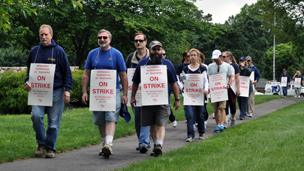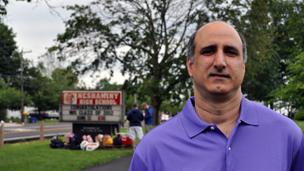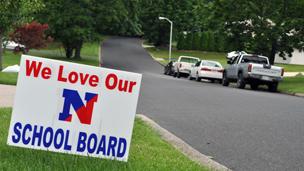The battle over pay raging within the US middle class
- Published
VIDEO: Teachers and their critics debate public funding
Wisconsin Governor Scott Walker, who has battled organised labour since 2010, has survived a rare recall election. Meanwhile in Levittown, Pennsylvania, a teachers' strike hints at the depth of animosity toward public employees.
In Levittown, Langhorne and other areas of the Neshaminy School District, outside of Philadelphia, the days in which teachers were seen as selfless guardians of the US middle class are long gone.
Striking teachers picketing outside the district school buildings are vilified by some angry taxpayers, who see them as overpaid and insulated from the hardship and pain shouldered by the neighbours who pay their salaries.
"They keep coming back and wanting more and more and more," says Stephen Pirritano, who owns an car repair shop and has two children in the district. "And the tax base can't support them."
The school district's teachers contract expired four years ago, about the same time as the economy entered a tailspin.
The teachers union says the school board in Neshaminy - nominally non-partisan but dominated by Republicans - has refused to bargain in good faith and is intent on blaming the teachers for the district's economic woes.
The school board, meanwhile, says the generous healthcare and retirement benefits the teachers have long enjoyed are now simply unaffordable.
The dispute in Neshaminy reflects a broader trend playing out across the country.
Public budgets have been constrained by the slow economy, and some state and local governments - mostly Republican-led - have responded by seeking to lay off public employees, cut their benefits, and restrict their ability to unionise.
At the bitter vanguard of the national anti-public union movement is Wisconsin's Republican Governor Scott Walker.

Teachers say they are fighting to hold their place in the middle class; opponents say they are coddled
Walker, elected amid the 2010 rise of the conservative, anti-tax Tea Party movement, pushed through bitterly divisive legislation severely restricting the ability of public employee unions - including public school teachers - to organise and bargain collectively.
The unions have long been a key Democratic voting block, leading to charges Walker and other Republicans are out to muzzle their political opponents.
Republicans in Idaho, Indiana and Ohio also passed laws limiting unions' ability to organise.
Public vs private
In Neshaminy, a smaller, slightly less vitriolic battle has played out in recent years.
Levittown and its environs were already hard-hit by decades of manufacturing plant closures, and the long economic downturn has not spared the region.
"On the news they say the economy is bouncing back," said Jared Katz, an English teacher and eight-year veteran of the Neshaminy school district, as he stood on the picket line.
"But unfortunately, we just don't feel it yet."

"We have good teachers in Neshaminy," Pirritano says - the problem lies with their union.
In Levittown, as elsewhere, private sector workers have lost jobs, seen their neighbours lose jobs, or had their pay and benefits slashed.
Meanwhile, the teachers enjoy strong protection from layoffs and pay cuts, as well as enviable health benefits and retirement guarantees - and they are fighting to keep them.
Some workers look on the teachers with something akin to resentment, people on both sides of the school contract debate say.
"It's the 'I don't have it, so why should you' approach," said Tara Huber, an English and journalism teacher at Neshaminy High School.
"I've been teaching for 15 years, and I never thought that I would be vilified, and that people would be jealous of me because I have an acceptable salary and a decent benefit package."
The resentment is compounded by the fact that taxpayers literally pay the teachers' generous salaries and subsidise their benefits.
"We are public-sector workers, so they are paying for what we get," said Katz, the English teacher.
"When they see that we have healthcare that is provided by the taxpayers, they say 'wait a second, I don't have that deal, why do you have that deal.'"
Supporters of the school board's efforts to rein in the teachers' pay and benefits say the school district simply cannot afford to maintain it.
And they complain that teachers have not helped shoulder the economic pain suffered by the taxpayers who ultimately pay their salaries.
"They get benefits that no one else gets," school board President Ritchie Webb told the BBC.
"It really comes down to money. The private sector is hurting, and the public sector - in this case the Neshaminy Teachers - don't understand 'no'. And they really are insulated from the woes of the community."

The dispute between the teachers and the school board has divided the community
The teachers plan to strike for up to 10 days during June in the hope of forcing the school board to the bargaining table with concessions.
Through the impasse, people on both sides say parents still respect and admire their children's individual teachers.
"We have good teachers in Neshaminy," says Stephen Pirritano, the mechanic. "You're never going to hear me say we don't have good teachers. There's teachers here that still care, that's not the point.
"When you're talking about the individual teachers it's different than when you're talking about the collective of the union."